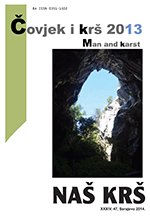LEAD-RICH SEDIMENTS FOUND IN SOME SPRINGS OF THE DINARIC KARST OF CROATIA
LEAD-RICH SEDIMENTS FOUND IN SOME SPRINGS OF THE DINARIC KARST OF CROATIA
Author(s): Frančišković-Bilinski Stanislav, Bilinski HalkaSubject(s): Environmental Geography, Applied Geography
Published by: Centar za krš i speleologiju
Keywords: Dinaric karst; Croatia; karstic springs; lead-rich sediments; toxicity;
Summary/Abstract: A summary of the current body of knowledge on lead-rich sediments found in some springs of the Dinaric karst of Croatia is presented. The karstic aquifers of Gorski Kotar (Frančišković-Bilinski et al.; 2013) and of the Biokovo Mt. (Matić et al.; 2012; 2013) were investigated on two occasions in the year 2010 as important sources of drinking water.The aim of the present work was to highlight the locations with lead-rich sediments; where concentrations of Pb are significantly higher than 250 mg/kg; what is the limit value which might cause significant toxic effects. In aquifers of Gorski Kotar highest Pb concentration of 734 mg/kg was measured in sediment taken at the Kupa River spring. In Biokovo Mt. aquifer highest Pb concentration of 5440 mg/kg was measured in sediment taken from Izbitac spring; one of captured springs being used for water supply of Makarska region. Elevated Pb concentrations in sediments of upper Kupa valley could be due to anthropogenic air-borne pollution from broader region; while elevated Pb concentrations in Biokovo Mt. spring sediments are probably of natural origin. But; to prove exact origin of Pb on both locations deserves much more additional investigations. In the current paper discussion of the existing knowledge of possible lead partitioning between the aqueous and solid phases is presented. This ultimately has ramification for lead mobility; bioavailability and toxicity. At the end a recommendation is given to monitor these Pb-rich springs over longer periods of time with respect of sediment and of water quality. Up to now the authorities of National Park Risnjak and of Water Supply Company of Makarska were not interested in current results; neither in further research of lead origin; its transport and possible health hazard.
Journal: Naš krš
- Issue Year: XXXIV/2014
- Issue No: 47
- Page Range: 36-44
- Page Count: 9
- Language: English

